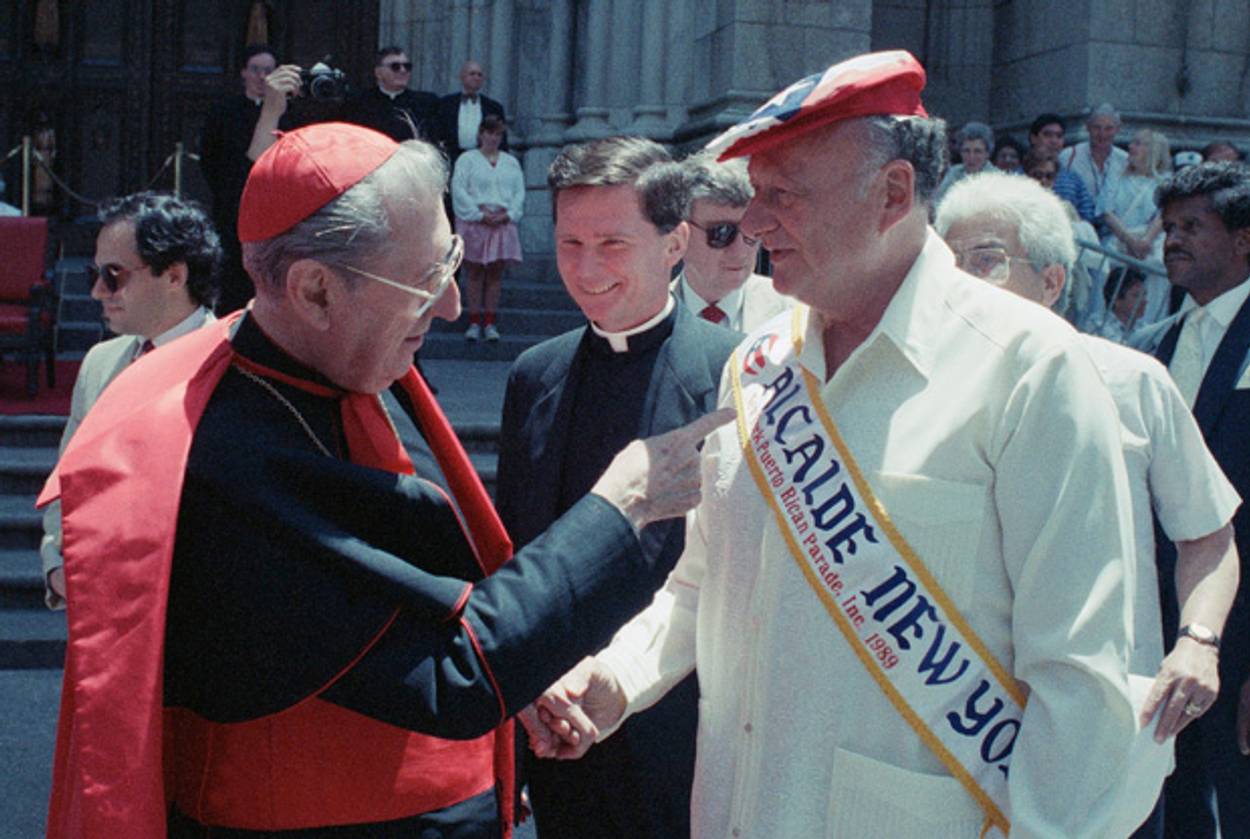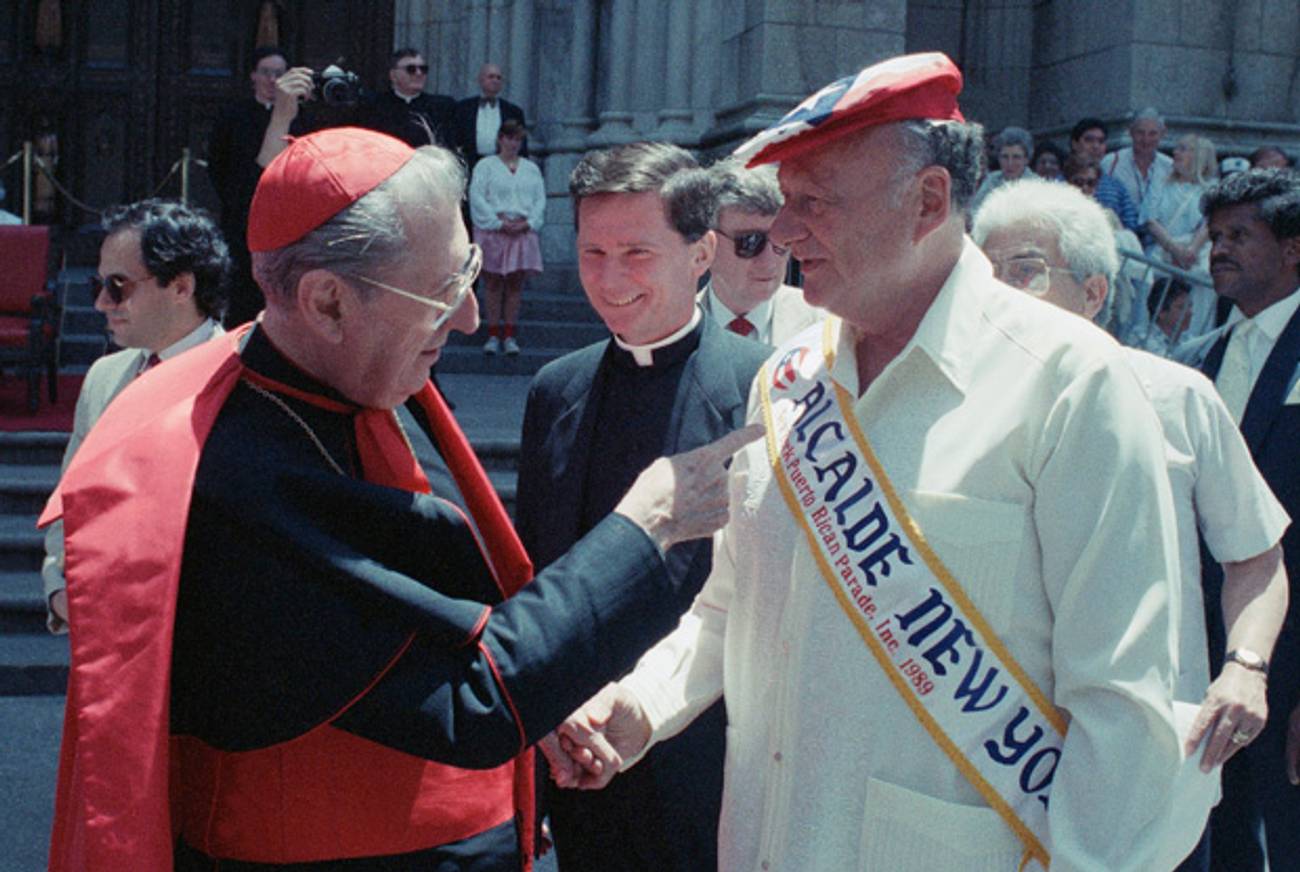Ed Koch’s Catholic Send-off
The former mayor, who had a deep relationship with Catholicism, will be memorialized in a Mass at St. Patrick’s




At the Feb. 4 funeral of Ed Koch, who died of heart failure at 88, the former mayor received one of the greatest send-offs in New York City history. Thousands of people gathered in the cavernous sanctuary of Temple Emanu-El on Fifth Avenue to hear personal and moving eulogies from his closest friends, his nephews and their children, the current mayor, an Israeli ambassador, and a U.S. president. At the conclusion of the uplifting service the organist played “New York, New York” as a funeral dirge. The casket was escorted to the curb, and the crowd, after rising in a standing ovation, spilled into the street, lingering to say goodbye and to reminisce.
It was an incredible, some might even say perfect, send-off for a larger-than-life mayor. But in fact, there was actually an element of the Mayor’s life that was not captured that day: his fondness for the Catholic Church.
Indeed, the Mayor had an unusually close relationship with the Catholic community—which everyone who worked with him, including me, knew. Of course, as was widely reported, Koch’s personally designed tombstone is emblazoned with the Shema and the last words spoken by Daniel Pearl, as well as Koch’s own declaration that he was “fiercely proud of his Jewish faith.” But it is also true that Koch knew the Catholic liturgy at least as well as the standard Jewish prayers. “Ed spent as much time in the cathedral as he did in the synagogue,” said Jim Gill, the Mayor’s law partner for 22 years and his interlocutor on all matters temporal and spiritual.
In fact, St. Patrick’s Cathedral was, according to many, almost a second home to the Mayor, who had a reserved front-row seat in the pews for Christmas Midnight Mass and Easter Sunday Morning for as long as anyone can remember. “We somewhat facetiously discussed the possibility of using St. Pat’s for the funeral because Emanu-El might not be big enough,” George Arzt, the Mayor’s longtime press adviser, told me. “And we all said, ‘Ed probably wouldn’t mind.’ ”
So now, thanks to Gill and others, with the blessing of Timothy Cardinal Dolan, Koch will get a special service in St. Patrick’s Cathedral on June 2. “Now that I no longer regularly go to lunch with the Mayor, I’ve lost 11 pounds,” Gill told me. “But I miss him. So does the cardinal. We all miss him. So, we’ve arranged for a Mass in his honor. The cardinal is going to commend his soul to the Lord.”
***
“Ed was Jewish to the core, but he had a special affinity for Catholics,” Diane Coffey, the Mayor’s former chief of staff and right hand, told me. “And he loved the Irish. He never missed the annual dinner of the Friendly Sons of St. Patrick—or the St. Patrick’s Day Parade.” The company of smart, quick wits was certainly part of the equation. The Mayor forged close friendships with all the cardinals of the New York Diocese. Bishop Joseph Sullivan and Bishop Francis Mugavero of the Brooklyn Diocese and Fordham University President Joseph O’Hare were his regular dinner companions. They talked plenty of politics at those dinners but also about religion and faith—which, over time, gave the Mayor a surprising familiarity with Catholic theology. “Ed lectured me on Church doctrine all the time,” says John LoCicero, the Mayor’s chief political adviser since their Greenwich Village days. “Sin, redemption, the afterlife. He said he knew more about it than me, and he did.”
Of all his friends in the clergy, though, Koch was perhaps closest to John Cardinal O’Connor. The Mayor went to the Vatican with a large group of prominent New York Catholics to witness the pope’s elevation of the cardinal from archbishop in 1985. For his part, the cardinal became a strong defender of Israel and an active friend of the Jewish community, declaring that year that anti-Semitism is a sin.
Today few recall the Parking Violations Bureau scandal of 1986. But it was a major corruption case in its time, one that nearly brought down the Koch Administration. The thieving and fraud of people the Mayor once trusted splattered mud on the Koch Administration’s reputation and brought the governance of the city to a standstill—and left the Mayor deeply depressed. It was in Cardinal O’Connor that he found solace when the cardinal reassured him that the public never doubted his honesty. A year later, when the Mayor suffered a stroke, the cardinal again was a main source of comfort.
I remember catching my own glimpse of their warm relationship in 1988, when the two men co-authored their book, His Eminence and Hizzoner. It was a challenging project that tested everyone’s patience at City Hall—except the Mayor’s, which was out of character for a man known to end meetings almost as soon as they began by a clap of the hands and the exclamation, “Done? Done!” But for this book, he seemed to have all the patience in the world. On the big issues like abortion and gay rights, while they declared respect for each other’s positions, there was no agreement whatsoever. But the Mayor, who generally let no one preach to him, seemed to actually enjoy being lectured by the cardinal. “Ed, you represent the learning and experience of a single lifetime of public service,” I remember the cardinal saying, “whereas I must speak for two thousand years of collective wisdom.” Amazingly, the Mayor soaked it up.
That same year, Koch joined the cardinal on a pilgrimage for peace and reconciliation in Ireland, in the wake of the murders of three Catholics killed by a Protestant gunman there. “I’m going to be the first Jewish soldier in the Cardinal’s Christian Army,” he announced. The trip was planned to allow for meetings with various dignitaries in both the republic and Northern Ireland, but the centerpiece was a pilgrimage to the Shrine of Our Lady of Knock in the republic where, in 1879, 15 people had seen an apparition of the Virgin Mary. “What we didn’t know was that the three days of the pilgrimage were built around a Triduum of Masses, meaning there were three a day. Ed was not one to take sitting easily for long stretches, but he did make it through the first three services without demonstrating too much agita,” Clifford Chanin, the Mayor’s deputy press secretary at the time and thereafter an occasional member of his Saturday lunch group, recently recalled. “I also think he was flattered by the regular acknowledgements that he received from the altar for his participation.”
When David Dinkins won the Democratic primary in the summer of 1989, effectively ending the Koch mayoralty, Cardinal O’Connor showed up at Gracie Mansion on election night to again provide support. As the Mayor noted repeatedly, the Lubuvitcher Rebbe didn’t call on him in his time of need, but the cardinal did.
The cardinal died in 2000 but remained a presence in the Mayor’s life. The Mayor kept his memorial card on his desk; he clasped it throughout a difficult heart and lung surgery in 2009. He credited the cardinal not only with pulling him through but also curing the spinal stenosis that had plagued him before the operation.
In face the Mayor’s relationship to Catholics and engagement with Catholicism ran so deep that some wondered about his beliefs—and whether they were as easily categorized as people assumed. The Mayor’s sincere belief in God and in an afterlife was strongly shaped by the influence of the Church, and it was in the Church’s language that he talked of them. When this came up in an interview in 1999, the late Tim Russert asked the Mayor if he ever considered converting. (“I’m a proud Jew,” he said, then dropped the subject.)
“You never really know what is in a man’s heart,” reminds Patrick Mulhearn, who served as the Mayor’s counsel for six years and his confidant for many more. “But if you are trying to suggest that Ed was a kind of secret Catholic, forget it. There were many levels to Ed’s relationship with the Church. It is certainly true that he forged some strong personal friendships there. But it was also the case that the city needed the Church to deliver health and education services. Currying favor with the Irish meant votes. So, much of it was just smart politics. I will say this, however: Ed had a deep appreciation for the consolation the Church provides in times of tragedy. He saw it at all the funerals he attended for fallen cops and firefighters. He saw how Det. Steven McDonald relied on faith to rebuild his life after being shot and paralyzed. He was in awe of that power. He admired it deeply. In a word, he had great respect for the Church.”
On June 2, the Church will demonstrate that the respect was mutual.
***
Like this article? Sign up for our Daily Digest to get Tablet Magazine’s new content in your inbox each morning.
A former adviser to Mayor Ed Koch, Jonathan R. Cohen is the Chief Operating Officer of Behan Communications.
A former adviser to Mayor Ed Koch, Jonathan R. Cohen is the Chief Operating Officer of Behan Communications.